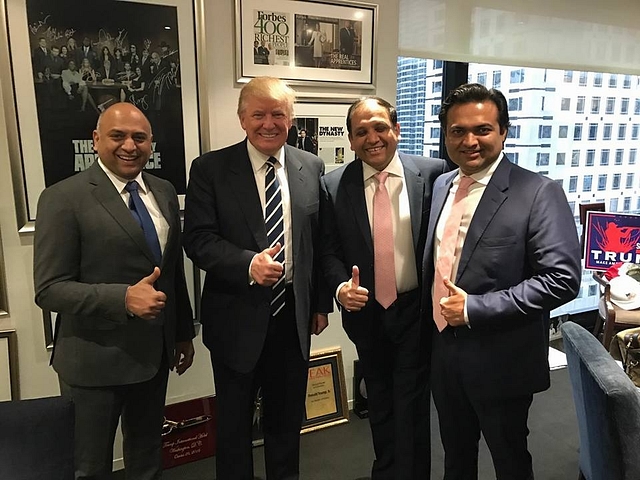
Jaanta Hai Mera Partner Kaun Hai? Trump’s Indian Buddies Hope To Cash In On Their Ties With Him
The United States (US) President-elect Donald J Trump met with his Indian realty partners last week at Trump Towers in New York. The New York Times reported that Trump’s business buddies were looking to exploit their relationship with the most powerful man in the world.
The New York Times quoted Pranav R Bhakta, a consultant with ties to Trump and who helped him get into business in India, as saying,
We will see a tremendous jump in valuation in terms of the second tower.....To say, ‘I have a Trump flat or residence’ — it’s president-elect branded. It’s that recall value. If they didn’t know Trump before, they definitely know him now.
Trump has strong links with Indian realtors, including the Lodhas of Mumbai, the Ireo Group of Gurugram and the Panchshil Realty Group of Pune among others. While Mangal Prabhat Lodha is a Bharatiya Janata Party (BJP) member, the Panchshil Group’s Atul Chordia has ties to Sharad Pawar; and Madhukar Tulsi of Ireo is a relative of BJP spokesman Sudhanshu Mittal.
The Economic Times also confirmed that the meeting did take place. It reported that Atul Chordia, Sagar Chordia and Kalpesh Mehta met with Trump at his Towers, where his children, Trump Jr, Ivanka and Eric were also present.
“He (Donald Trump) was praising Modiji as always and added that he is doing a great job,” The Economic Times quoted Sagar Chordia as saying.
Kalpesh Mehta reportedly said that Trump’s kids were aware of the currency demonetisation announced by the Indian government and hailed it as an incredibly bold move. According to Mehta, Trump’s projects in India - five of them so far - are worth $1.5 billion.
Trump’s meeting didn’t go down well with the media in the US. Eyebrows were raised over Trump still keeping ties with his businesses when inside a couple of months he will shoulder the responsibility of running the country.
There is an issue of ethics too. Some lawyers say the appearance of business partners benefiting from their proximity to the next US President doesn’t look good. One lawyer even called Trump’s activities “unprecedented in modern history”.
This is obviously an exaggeration. Businesses and politicians have always maintained relationships in America, with super-achievers often moving between governmental and private sector roles with ease. Remember the proximity of Texan oil interests to then-President George W Bush? Remember Hank Paulson, Treasury Secretary under Bush and a former chief executive officer at Goldman Sachs, who told a bunch of hedge fund managers a few weeks before Lehman went bust that Uncle Sam would soon be seizing Fannie Mae and Freddie Mac, two government-backed mortgage institutions? Paulson then gave them insider information on shorting the market before the crash. No clash of interest here? Paulson was not even investigated for his wrongdoing.
Why go that far? It is now well established that Clinton Foundation received huge sums of donation from Saudi interests, but media chose to rubbish this story as not potentially leading to a conflict of interest. Rather, media said it did not matter since all the money went to charity. To assume that there is no conflict of interest if the money goes to charity is incorrect, for no charity will kick its benefactors in the butt if there is a conflict of interest at some future date. The Saudis don’t pay good money just out of the goodness of their hearts.
In any case, Trump’s realty ties to India are something we should be concerned about, not the US, for Indian politics is closely linked to benami properties and illegal wealth hoards invested in property. If it came to a conflict of foreign policy interests, Trump’s clout will help the US trump Indian national interests and not the other way round.
The Trump connection to Indian realty is a danger to Narendra Modi’s plans to provide housing for all because it could drive up land prices unreasonably high at a time when property is already unaffordable to all but the super-rich. In fact, when Trump was in Mumbai in mid-2014, he made the ridiculous claim that Indian property was ultra-cheap. He told Financial Times at the time: “I like coming into markets where it is good for an investor to buy (property) and do something special. Prices in Mumbai, in my opinion, are unbelievably low.”
The main lesson for us to learn is simple: In the US, conflicts of interest get investigated. In India, we are blasé about it. It’s time we started working up a fit over conflicts of interest here too.
Also Read:
Trump’s Realty Links To India: Why We Should Be More Worried Than The US